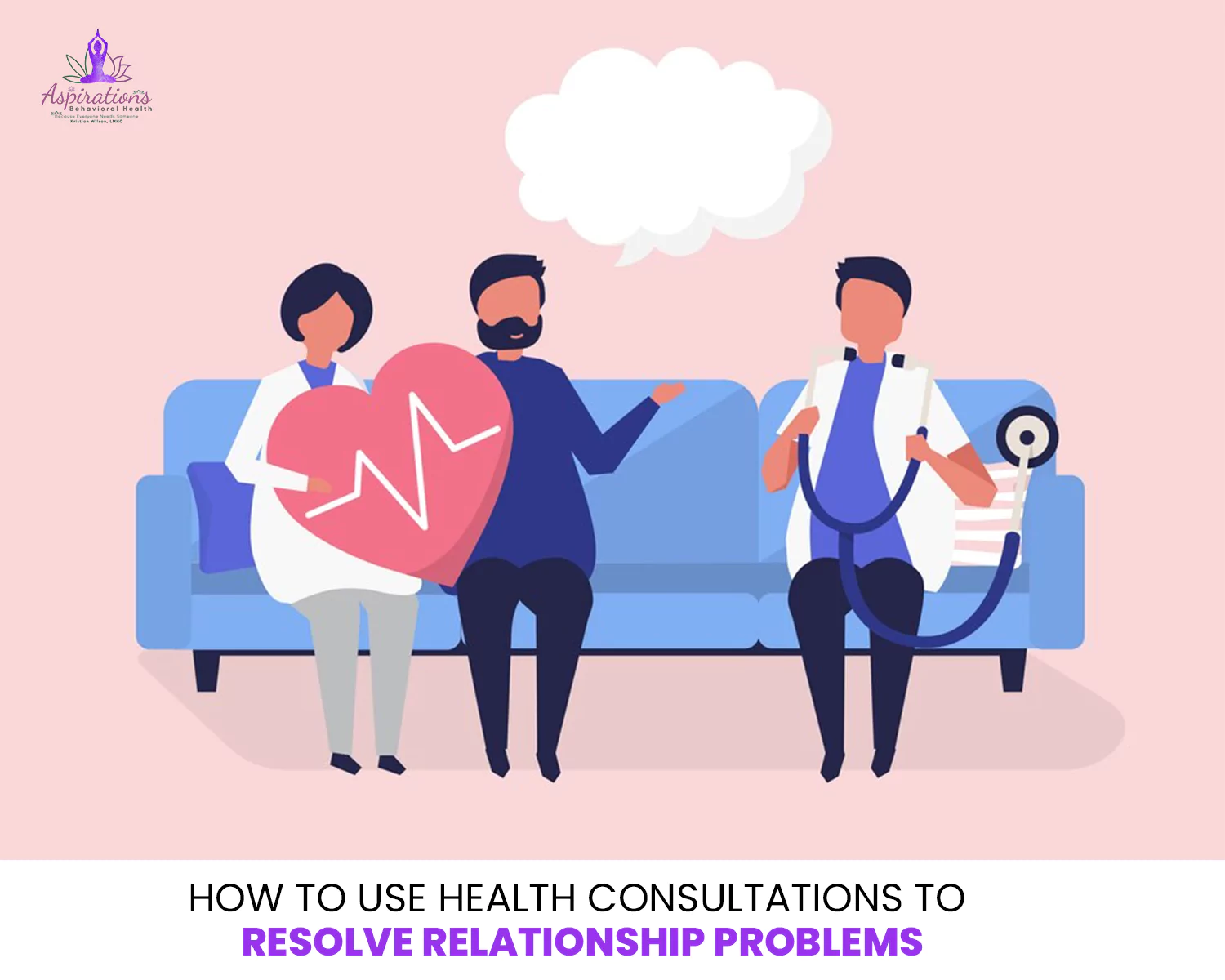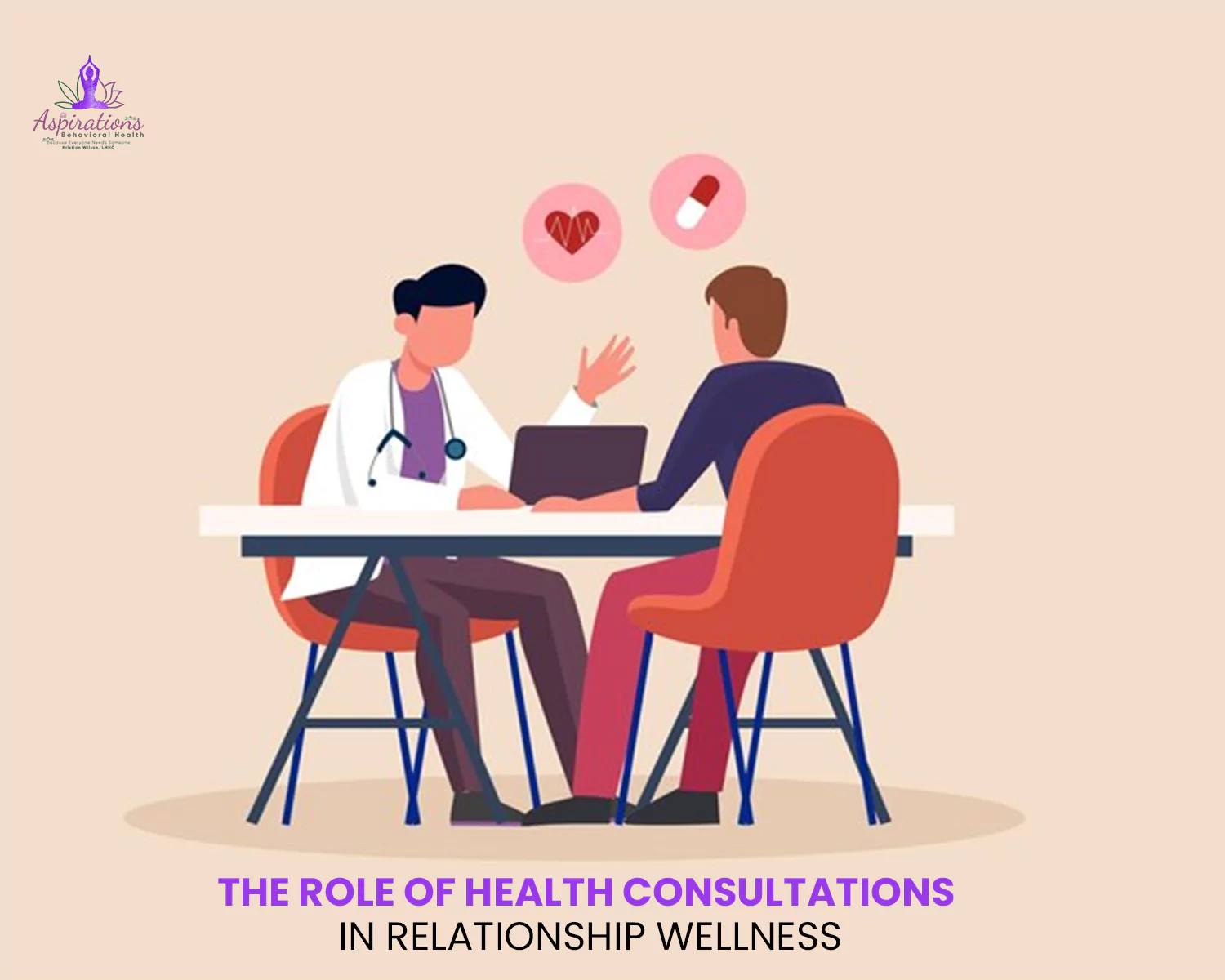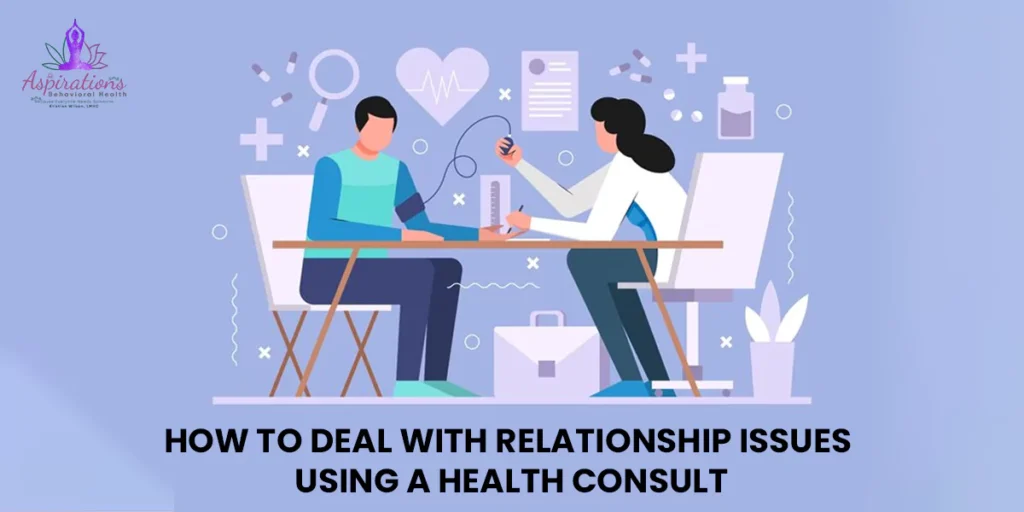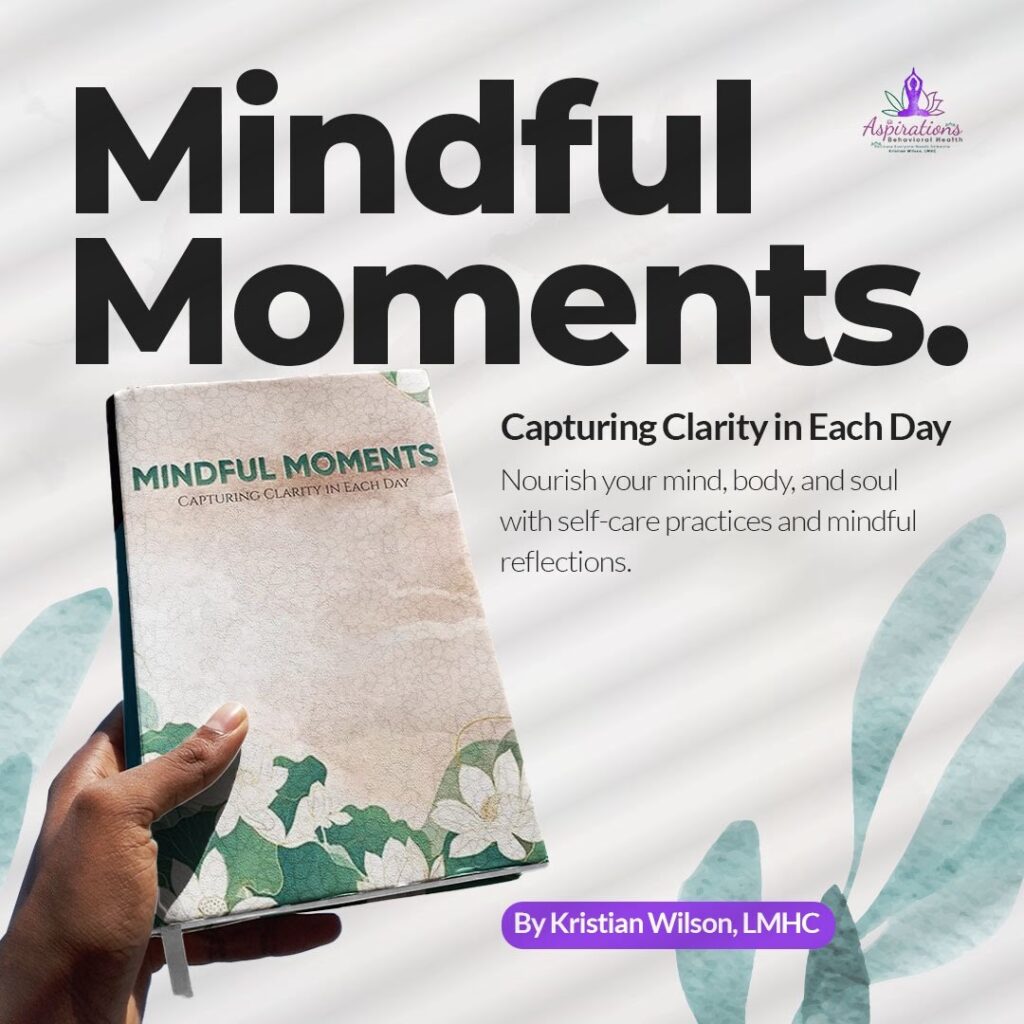Emotions, actions, and health all intersect in relationships, which are intricate ecosystems. managing relationship problems, whether they are caused by disagreements, intimacy problems, or failures in communication, you can sometimes feel as though you are lost in a maze. But what if I told you that getting advice from a health consultant may be like a lighthouse amid confusion? This in-depth manual will examine how using health consultations to resolve relationship problems can be a game-changing strategy.
Take aways:
- Give boldness, empathy, and attentive listening a lot of weight when having a conversation.
- Take care of your physical health by getting adequate rest, controlling your stress, and exercising.
- You can develop an emotional connection with your spouse if you are honest and encouraging of them.
- To release tension and advance wellbeing, work together on stress management strategies.
- Within the relationship, set up and honor appropriate boundaries.
- When you need it, get help from a professional, like counseling or therapy.
- Acknowledge and encourage one another’s aims while celebrating personal development.
How to use health consultations to resolve relationship problems

Communication Styles: Effective communication is the foundation of healthy relationships. Everybody has a unique communication style shaped by their background, circumstances, and culture. Understanding one partner’s assertiveness, passivity, or violence affects how needs are expressed, disagreements settle, and closeness develops.
Attachments: According to attachment theory, an individual’s early experiences impact their attachment style, defining adult relationships. In partnerships, secure attachment promotes closeness, trust, and feelings of belonging, while insecure attachment might be anxiety, avoidance, or ambivalence. Comprehending each other’s affection styles helps couples better meet and react to each other’s emotional needs and desires.
Power dynamics: The distribution of authority, power, and decision-making in a relationship is known as power dynamics. Equality, mutual respect, and working together characterize successful partnerships where each member enjoys liberty and a voice. Power disparities can weaken intimacy and trust as they give rise to feelings of manipulation, repression, or bitterness.
Techniques for Resolving Conflicts: Relationships will undoubtedly experience disagreements; however, how they are resolved will determine how solid and long-lasting the tie is. Conflict resolution techniques can result in collaboration, rivalry, accommodation, negotiation, and other results. Effective conflict resolution requires an empathic approach, delegation of power, mutually beneficial solutions that consider both sides’ interests and active listening.
Sexual Intimacy: Physical attraction, satisfaction of desire, and sexual closeness are all essential elements of love relationships. However, sexual dynamics can be affected by a variety of factors, including communication barriers, stress, past experiences, and personal preferences. Respect for one another’s needs, honest communication, and mutual attention are all necessary to promote sexual connection.
Life Transitions and pressures: External pressures such as illness, children, career changes, and economic strain can have a significant impact on relationship dynamics. Couples must be there for one another during these transitions and respond to them with adaptability and resilience. By recognizing how external factors affect relationship dynamics, partners can work together more cohesively while demonstrating greater solidarity.
Family of Origin Influences: Experiences from one’s family of origin, such as parental modelling, attachment styles, and cultural norms, influence one’s expectations and interpersonal behaviours. Partners can find triggers, trends, and opportunities for development or healing by better understanding how familial dynamics impact the dynamics of their current relationships.
Personal Growth and Development: People change and develop throughout their lives, affecting the dynamics of relationships. Relationships encouraging individual development, independence, and self-awareness result in higher contentment and happiness. Relationships’ Resilience and longevity increase when partners embrace change, support one another’s objectives and preserve their separate identities.
Recognizing the Role of Health in Relationships
Understanding how different facets of well-being—physical, mental, emotional, and relational—affect the dynamics and calibre of partnerships is necessary to appreciate health’s role in relationships. Here is a thorough examination of every element:
Physical Condition: Overall well-being, including nutrition, exercise, sleep patterns, and medical issues, is called physical health.
Relationship dynamics are directly impacted by maintaining physical health in several ways:
Energy Levels: A person’s state of health affects their ability to assist their partner, participate in activities together, and be an active member of a relationship.
Stress management: Lowering stress using regular exercise and a balanced diet makes resolving conflicts and problems in relationships easier.
Sexual satisfaction: Someone’s sexual activity, sexual health, and general level of contentment in close relationships can all be impacted by their physical state.
Mental health: Elasticity, emotional control, and stress management are all mental and emotional health aspects.
Mental health has a significant influence on relationships since it affects:
Proficiency in Communication: The state of one’s mind impacts one’s capacity for effective communication, emotional expression, and partner empathy.
Good mental health makes people more capable of handling problems constructively without turning to negative behaviours or communication styles.
Emotional Connection: A person’s psychological well-being impacts the formation and upkeep of emotional bonds, which foster intimacy, trust, and support between partners.
To emotionally well mean to be able to identify, communicate, and healthily regulate one’s emotions.
Emotional wellness affects relationship dynamics in the following ways:
Empathy and Understanding: People with good emotional health can connect with their partners, give them credit for their feelings, and show them support.
Openness and Intimacy: Deeper psychological intimacy and connection are facilitated by partnerships where openness and honesty are encouraged by emotional well-being.
Good psychological health makes a person more capable of controlling their emotions, which reduces the adverse effects of mood swings, temper tantrums, and psychologically charged relationships.
The Role of Health Consultations in Relationship Wellness:

Health consultations provide a comprehensive framework for resolving relationship problems. The consultations use a more integrated approach than traditional therapy, which might only concentrate on interpersonal dynamics. Health consultants look at nutrition, physical activity, sleep patterns, stress reduction, and mental health to find the root causes of relationship problems.
How to Deal with Relationship Issues Through Health Consultations:
Comprehensive Health Assessment: Begin by carefully assessing your physical, mental, and emotional health. In addition, this evaluation forms the foundation for understanding how relationships are impacted by personal health.
Establishing an Environment for Open Communication: Effective communication is the foundation of healthy relationships. Moreover, health professionals advise patients to communicate openly to freely share their hopes, fears, and concerns without fear of criticism. By implementing active listening and empathy-building strategies, couples can strengthen their understanding and relationship.
Strategies for managing stress: Relationships suffer from continual strain, negatively impacting health. Health clinics offer stress-reduction techniques, including contemplation, prayer, and relaxation, to lower stress and promote resilience to emotion.
Nutritional Advice: Maintaining overall health and managing mood depend on eating nutritious foods. Health professionals offer personalized food recommendations to improve cognitive concentration and emotional equilibrium. Including mood-boosting meals rich in vitamins, omega-3 fatty acids, and antioxidants can improve relationship dynamics.
Physical Activity and Intimacy: Exercise improves mood, libido, and physical health. Health consultations highlight the value of consistent physical activity in fostering closeness and a sense of community among partners. Cooperative pursuits such as hiking, yoga, or dancing can rekindle enthusiasm and enhance emotional bonds.
Resolving Underlying Trauma: Relationship dynamics can be significantly impacted by unresolved trauma from previous experiences. Health consultations offer A secure setting for the investigation and processing of prior traumas using methods including somatic experience, EMDR, and cognitive-behavioural therapy (CBT). Couples can develop intimacy, trust, and empathy by attending to underlying trauma.
Lifestyle Adjustments: A person’s work-life balance, drug usage, and quality of sleep all significantly impact the health of their relationships. Couples and health specialists collaborate to pinpoint problem areas and carry out long-term lifestyle changes.
Establishing nighttime routines, reducing alcohol consumption, and prioritizing quality time spent together can create a more harmonious relationship atmosphere.
Transform Your Relationship: Expert Counseling Just a Click Away with Aspirations Behavioral Health!
Experience transformative online relationship counseling with Aspirations Behavioral Health. Our expert therapists provide personalized support to help couples navigate challenges, enhance communication, and foster deeper connections. Take the first step towards a healthier, happier relationship. Book your session today! “Start your journey to stronger, more fulfilling relationships. Schedule your online counseling session now!
FAQs
According to studies, relationship counselling conducted online may be just as effective as traditional in-person therapy. However Virtual therapy sessions are now more straightforward and accessible than ever, thanks to technological advancements, providing knowledgeable counselling and support from certified specialists.
Online relationship counselling can help with a variety of problems, including impermanent relationships, trust issues, intimate worries, disputes, adultery, and premarital therapy. However, the tailored treatments counsellors provide meet a couple’s specific needs and goals.
In order to receive online relationship counseling, a qualified therapist would usually schedule phone or video sessions. Couples discuss openly, investigate underlying problems, pick up practical communication techniques, and additionally put newly acquired skills into practice in order to strengthen their bond. Therapists provide a nonjudgmental, encouraging atmosphere in private, confidential sessions.
The following factors should be taken into account when selecting an online relationship counselor: their credentials, background dealing with couples, therapy style, and alignment with your values and requirements. It’s crucial to choose a therapist you trust and who you feel at ease with in order to receive help during your relationship journey.
Conclusion:
People experience relationships as dynamic processes marked by development, difficulties, and change. A health-focused approach can help couples deal with marital problems with more clarity, compassion, and resilience. In addition health consultations offer a comprehensive framework for cultivating love and establishing deeper connections, ranging from open communication and stress management to nutritional assistance and lifestyle improvements. Recall that putting your health first and respecting your growth journey together are the first steps towards a healthy partnership.



